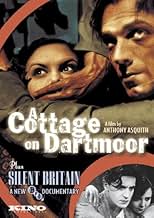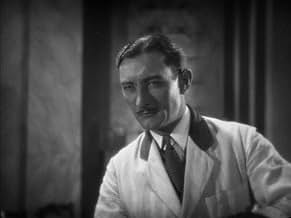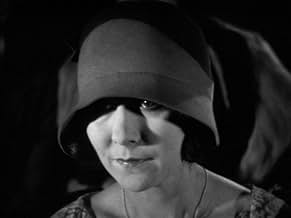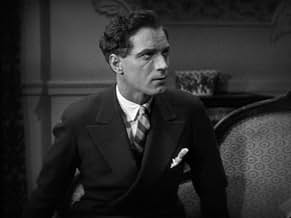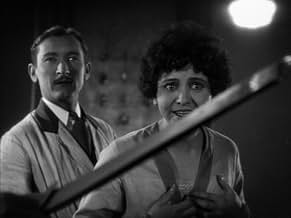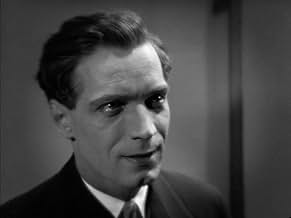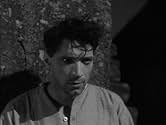A Cottage on Dartmoor
- 1930
- 1h 28min
CALIFICACIÓN DE IMDb
7.5/10
1.3 k
TU CALIFICACIÓN
Agrega una trama en tu idiomaA former barber escapes from a high security prison. Flashback story of an escape from the lonely, high-security Dartmoor Prison.A former barber escapes from a high security prison. Flashback story of an escape from the lonely, high-security Dartmoor Prison.A former barber escapes from a high security prison. Flashback story of an escape from the lonely, high-security Dartmoor Prison.
- Dirección
- Guionistas
- Elenco
Hans Adalbert Schlettow
- Harry - a Dartmoor Farmer
- (as Hans Schlettow)
Anthony Asquith
- Bespectacled Man in Cinema
- (sin créditos)
Judd Green
- Customer
- (sin créditos)
- Dirección
- Guionistas
- Todo el elenco y el equipo
- Producción, taquilla y más en IMDbPro
Opiniones destacadas
From time to time, it is very laudable for this German count to re-watch some of those silent films of his aristocratic youth. Overall, this in order to check if the passage of time has positively or negatively influenced his recollection of the remarkable aspects of such films. That's not to mention that fortunately many of those films after such long time are now cleaned and restored -- nothing in common with those rotten and blurred nitrates that are stored at this Herr Graf's gloomy cellar that necessarily need an extra pair of monocles each time that they are shown at the Schloss theatre.
This time such advisable aristocratic and nostalgic film habits had excellent artistic results. That's because after 70 years from its official release, "A Cottage On Dartmoor", a film directed by Herr Anthony Asquith, preserves intact its many and excellent virtues. The perfect word that summarizes the merits of that British film: virtuosity.
Herr Anthony Asquith skillful film direction begins as the films starts. It introduces a convict that escaped from prison running away along Dartmoor meadows. With the sole purpose of revenge, he tries to find the girl that causes him imprisonment; when finally he finds her, a fascinating flashback starts.
A superb display of film technique can be seen in the film. There are such as perfect images ( Expressionism influences are obvious in the film, in its obscure and visual conception ) concatenations or fascinating visual metaphors ( the use of the camera is astounding: remarkable and imaginative camera angles that scrutinizes the tormented soul and evil intentions of the main character of the film ). It depicts an intriguing, thrilling and original story. A barber, Joe ( Herr Uno Henning ) falls in love with a manicurist, Sally ( Dame Norah Baring ) in the same place where both work. Joe is rejected by her and doesn't accept that ultimately Sally loves a client, Harry ( Herr Hans Adalbert Schlettow ). Consumed by jealousy, tries to murder Harry.
It has a perfect "tempo" in order to explain and show such a tormented love story that will finish with a poetic, sorrowful ending. Only one thing is lacking in seeing the film and is Dame Norah Baring's performance. Probably she is so stiff, inexpressive and frigid due to the abuse of the use of tea -- that awful beverage that usually is drunk by commoners and even eccentric aristocrats in the perfidious Albion. But that's a minor flaw that doesn't damage excessively the excellent artistic merits of such remarkable film.
And now, if you'll allow me, I must temporarily take my leave because this German Count must go to a decadent soirée pretty well-combed.
Herr Graf Ferdinand Von Galitzien http://ferdinandvongalitzien.blogspot.com/
This time such advisable aristocratic and nostalgic film habits had excellent artistic results. That's because after 70 years from its official release, "A Cottage On Dartmoor", a film directed by Herr Anthony Asquith, preserves intact its many and excellent virtues. The perfect word that summarizes the merits of that British film: virtuosity.
Herr Anthony Asquith skillful film direction begins as the films starts. It introduces a convict that escaped from prison running away along Dartmoor meadows. With the sole purpose of revenge, he tries to find the girl that causes him imprisonment; when finally he finds her, a fascinating flashback starts.
A superb display of film technique can be seen in the film. There are such as perfect images ( Expressionism influences are obvious in the film, in its obscure and visual conception ) concatenations or fascinating visual metaphors ( the use of the camera is astounding: remarkable and imaginative camera angles that scrutinizes the tormented soul and evil intentions of the main character of the film ). It depicts an intriguing, thrilling and original story. A barber, Joe ( Herr Uno Henning ) falls in love with a manicurist, Sally ( Dame Norah Baring ) in the same place where both work. Joe is rejected by her and doesn't accept that ultimately Sally loves a client, Harry ( Herr Hans Adalbert Schlettow ). Consumed by jealousy, tries to murder Harry.
It has a perfect "tempo" in order to explain and show such a tormented love story that will finish with a poetic, sorrowful ending. Only one thing is lacking in seeing the film and is Dame Norah Baring's performance. Probably she is so stiff, inexpressive and frigid due to the abuse of the use of tea -- that awful beverage that usually is drunk by commoners and even eccentric aristocrats in the perfidious Albion. But that's a minor flaw that doesn't damage excessively the excellent artistic merits of such remarkable film.
And now, if you'll allow me, I must temporarily take my leave because this German Count must go to a decadent soirée pretty well-combed.
Herr Graf Ferdinand Von Galitzien http://ferdinandvongalitzien.blogspot.com/
Firstly, let me say that my little lad eats the occasional rusk and loved them when a baby (now nearly 4). I loved this movie...I saw it for the first time last night on the BBC. I too enjoyed the flashback vehicle, which by using the exclamation (via title) "Joe!" jolted us into flashback. I thought the use of mirrors imaginative and symbolic (Norah appearing at times a disembodied - if beautiful - head among possessive men in the barbershop. I was quite enthralled by the big farmer coming in for a manicure (wink-wink). The images are on reflection quite disturbing in the barbershop...a man having his hands caressed by a pretty girl whilst a cut throat razor is applied to his throat. I too found the trip to the cinema memorable and also poignant. The director at pains to reveal to us the value of the cinema orchestra at a time when their jobs would have been in extreme peril. Couple this with mention of a "talkie" earlier (this received a blank response) and these elements could be viewed as a swan song for the silents. You must see this film, it is truly wonderful. The performances are spot on and it does not always take the predictable turn. Considering the intensity of obsession the male lead character conveys, the film develops great warmth. UNIQUE!!
Anthony Asquith is best known for straightforward film-making in the so-called British literary tradition which served him particularly well in stage-to-screen adaptations of G. B. Shaw & Terrence Rattigan. Letting the writer function as auteur doesn't win you critical kudos, but films as fine as PYGMALION/'38 and THE BROWNING VERSION/'51 don't just 'happen.' Even so, it's fun to watch the young Asquith show off, even needlessly, on late silents like this & UNDERGROUND/'28, also out on DVD. You can all but hear him parsing the latest Russian or German import just screened at his CineClub. There's some strikingly fast montage work and psychological P.O.V. stuff (even a shock-flash of red tinting as in the original prints of Hitchcock's SPELLBOUND/'45), but the main influence is UFA studios with their posh camera moves, rich visual texture, expressionist acting, shadowy lighting & diagonal slashes The opening works best as Swedish actor Uno Henning (in his only British role, he's an intriguing mix of Buster Keaton & Conrad Veidt) breaks out of prison in search of revenge. The story flashes back to detail a rather commonplace love triangle that gives Asquith plenty of space for his set pieces (a visit to the cinema, a very close shave, et al.) which tend to run on a bit too long. But no matter, it's all ravishing to watch and if the characterizations never quite add up, the visual touches are worth the stretch.
Sally lives in a cottage on Dartmoor when, on a dark and quiet night, a man breaks into her home having just escaped the high-security prison across the moors. That man is none other than Joe, a former barber's assistant at the place where Sally used to be a manicurist. As they connect eyes, the audience flashback to the times where Joe and Sally once worked together and he had tried to woo her at the beginning of a series of events that now brought them to this place.
The BBC's summer of British films this year turned out to be better than I expected it to be because, instead of wheeling out Zulu, Dam Busters and all the usual British films, they actually screened lots of films that I had not seen or, in some cases, heard of. Of course this meant that some of them were not any good but at least it was an attempt to fresh up the idea of what British cinema is. A Cottage on Dartmoor is a good example of this as it is rare for silent films to be screened on television and far more rare for them to be British silent films. I had never seen this and I enjoyed it a great deal.
Narrative-wise the film opens with an element of fear and tension before jumping back to more of a comedy and romance. As this builds back to where it started again for a good finish. The film is maybe 15 minutes too long for the material to sustain but otherwise it is well delivered. The funny bits are amusing, the tense bits tense and the romance nicely melodramatic and tragic, however it is the delivery that makes the film specifically that of Asquith and his cinematographer. Visually the film matches the tone of the film really well opening and closing with sharp shadows on the moors, and enjoying a bright and carefree air early in the barbershop scenes. The images are sharp and really well formed with plenty of clever shots. Mirrors are used well, conversations represented by stock footage, flashbacks delivered within flashbacks and a great scene where we watch a cinema audience reacting to a film they are watching. Visually and technically it is very impressive and I enjoyed it a great deal.
Deserves to be screened a lot more than it is and be seen by more people than it is, but credit to the BBC for showing it recently.
The BBC's summer of British films this year turned out to be better than I expected it to be because, instead of wheeling out Zulu, Dam Busters and all the usual British films, they actually screened lots of films that I had not seen or, in some cases, heard of. Of course this meant that some of them were not any good but at least it was an attempt to fresh up the idea of what British cinema is. A Cottage on Dartmoor is a good example of this as it is rare for silent films to be screened on television and far more rare for them to be British silent films. I had never seen this and I enjoyed it a great deal.
Narrative-wise the film opens with an element of fear and tension before jumping back to more of a comedy and romance. As this builds back to where it started again for a good finish. The film is maybe 15 minutes too long for the material to sustain but otherwise it is well delivered. The funny bits are amusing, the tense bits tense and the romance nicely melodramatic and tragic, however it is the delivery that makes the film specifically that of Asquith and his cinematographer. Visually the film matches the tone of the film really well opening and closing with sharp shadows on the moors, and enjoying a bright and carefree air early in the barbershop scenes. The images are sharp and really well formed with plenty of clever shots. Mirrors are used well, conversations represented by stock footage, flashbacks delivered within flashbacks and a great scene where we watch a cinema audience reacting to a film they are watching. Visually and technically it is very impressive and I enjoyed it a great deal.
Deserves to be screened a lot more than it is and be seen by more people than it is, but credit to the BBC for showing it recently.
I'm extremely impressed with every aspect of 'A Cottage on Dartmoor', directed by the underrated Anthony Asquith (son of the Prime Minister). The camera-work features some superb tracking shots, kept perfectly in focus by focus-puller Arthur Woods (later a brilliant director in his own right, all too briefly before his death in World War Two). There is a clever and subtle flashback transition. The frame compositions are excellent, as are the performances by this obscure cast. At the climax of this monochrome film, there is a single flash of red: Hitchcock would later use this same device in 'Spellbound'. I wonder if Hitchcock copied it from Asquith.
Most of this story takes place in flashback, a device which I normally dislike. Flashbacks are now so hackneyed that there is an entire cinematic grammar of flashbacks: the screen goes blurry, the soundtrack swells with theremin music. Here, the transition to flashback is done subtly, with the first dialogue intertitle bridging the shift. Well done!
Some minor details distressed me. We see a prisoner who escaped from Dartmoor. His uniform displays a number, but shouldn't it also have the broad arrow? Also, since Joe (the convict) has sworn revenge against Harry Stevens -- his rival for the affection of Sally -- why ever have Harry and Sally moved to a remote cottage on Dartmoor, conveniently close to Joe's prison? This is the sort of thing which Hitchcock identified as 'icebox logic', the cinematic equivalent of "esprit d'escalier".
This film was made at an awkward moment of cinema history. The movie is silent, yet (in the dialogue titles) the characters on screen discuss going to 'a talkie'. But when they go to the cinema, a live orchestra are playing ... which indicates that the movie being shown is a silent. And an insert shot of a programme book tells us that the movie is Harold Lloyd's 'Safety Last', definitely a silent.
Not the least of this film's pleasures is its depiction of life in George V's England. I got a twinge of nostalgia from a brief shot of an infant clutching a rusk. (Do modern babies eat rusks?) In the central role, Norah Baring is excellent: portraying a simple manicurist, she is personable and pleasant to look at, without the implausible amount of glamour that a Hollywood actress would have brought to such a workaday role. I'll rate this fine character drama 8 out of 10.
Most of this story takes place in flashback, a device which I normally dislike. Flashbacks are now so hackneyed that there is an entire cinematic grammar of flashbacks: the screen goes blurry, the soundtrack swells with theremin music. Here, the transition to flashback is done subtly, with the first dialogue intertitle bridging the shift. Well done!
Some minor details distressed me. We see a prisoner who escaped from Dartmoor. His uniform displays a number, but shouldn't it also have the broad arrow? Also, since Joe (the convict) has sworn revenge against Harry Stevens -- his rival for the affection of Sally -- why ever have Harry and Sally moved to a remote cottage on Dartmoor, conveniently close to Joe's prison? This is the sort of thing which Hitchcock identified as 'icebox logic', the cinematic equivalent of "esprit d'escalier".
This film was made at an awkward moment of cinema history. The movie is silent, yet (in the dialogue titles) the characters on screen discuss going to 'a talkie'. But when they go to the cinema, a live orchestra are playing ... which indicates that the movie being shown is a silent. And an insert shot of a programme book tells us that the movie is Harold Lloyd's 'Safety Last', definitely a silent.
Not the least of this film's pleasures is its depiction of life in George V's England. I got a twinge of nostalgia from a brief shot of an infant clutching a rusk. (Do modern babies eat rusks?) In the central role, Norah Baring is excellent: portraying a simple manicurist, she is personable and pleasant to look at, without the implausible amount of glamour that a Hollywood actress would have brought to such a workaday role. I'll rate this fine character drama 8 out of 10.
¿Sabías que…?
- ErroresJoe's coworker reaches down to pick up the movie tickets with his right hand, but the close-up shows his left hand grabbing them.
- ConexionesFeatured in Cinema Europe: The Other Hollywood (1995)
Selecciones populares
Inicia sesión para calificar y agrega a la lista de videos para obtener recomendaciones personalizadas
Detalles
- Tiempo de ejecución
- 1h 28min(88 min)
- Color
- Mezcla de sonido
- Relación de aspecto
- 1.20 : 1
Contribuir a esta página
Sugiere una edición o agrega el contenido que falta

